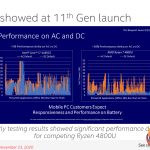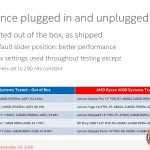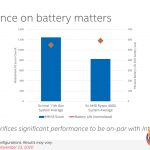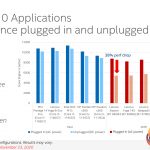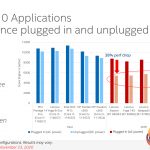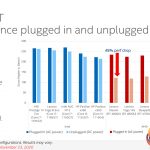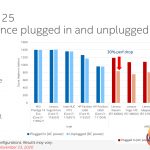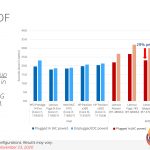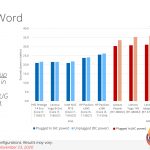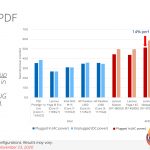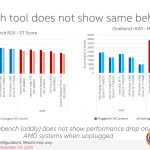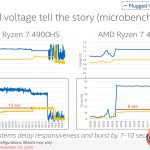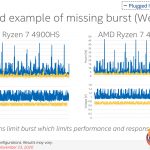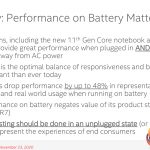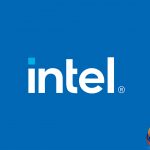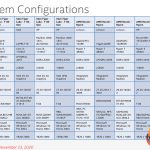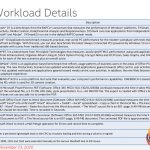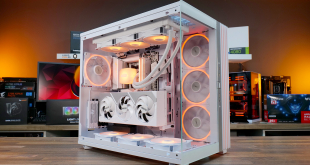Leo recently sat through an Intel briefing relating to benchmarking laptops and focusing on performance both with and without the power adapter connected. Throughout, Intel was keen to highlight the AMD drops performance by a higher percentage in their own testing.
Luke and Leo discuss this briefing and wonder why Intel is so keen to publicise AMD's weaknesses rather than focusing on Intel's own strengths.
Video Timestamps:
00:00 Video start
00:13 Intel trying to pull the wool over Leo’s eyes?
01:14 Benchmarking mobile processors: Intel style
02:54 Intel show analysis without Intel processors ?
04:53 It is also a bit peculiar … hit me with the kill shot
06:30 AMD possible response ? battery discussion
07:40 Your guess is as good as mine
08:34 What Intel will be saying
10:10 Lukes and Leo on ‘interesting’ survey presentation results
14:52 Conversations with AMD
15:58 ‘AMD systems delay responsiveness’ discussion
18:56 Are Intels claims ‘real world’ use?
21:13 Closing Thoughts
Video Points:
- Leo trolls Luke and then moves swiftly on!
Intel's Unusual Briefing
- Intel did a briefing on benchmarking and testing mobile processors
- Some of the points were… bizarre
- Intel argues that AMD laptops lose a high percentage of performance when run on battery
- A Principled Technologies benchmark – we all know how that went last time round…
Intel Focuses on AMD More Than Intel
- Intel tests AMD and AMD… but not Intel!
- Intel implies that their own way is right, and AMD’s alternative way is wrong
- Is that a reasonable claim? Perhaps AMD has simple chosen a different approach.
- Is this simply Intel having a pop at AMD?
- Why can’t Intel focus on their own strengths, rather than making all this effort to highlight AMD’s weaknesses?
What About Battery Capacity?
- The Intel NUC laptop has an unusually large battery for the comparison systems being shown
- Should AMD respond to these claims?
- Better battery life is better battery life. Who cares if it comes via a bigger battery?
- Leo still likes the ASUS ROG Zephyrus G14 with Ryzen 4000
- Leo previewed an Intel Tiger Lake laptop but was disallowed from doing battery testing
- Is this because of the significantly higher power states applied for PL1 and PL2?
Survey Seems To Be For Less Performance Demanding Users
- This survey from Intel has many responders but the figures suggest these are laptops used by people in big corporations
- Perhaps these survey responders will have basic use cases for the likes of working with Microsoft Office and PDFs but not more demanding tasks where AMD does well
- Is having better performance for the longer, more demanding tasks arguably more important?
- Do you actually run very demanding laptop tasks with the power cord unplugged?
Is Intel Simply Arguing That They Disagree With AMD's Decision?
- The processor operating characteristics certainly look to be an intentional decision by AMD, even though Intel seems to be taking offence by those decisions
- Perhaps AMD will fire back and claim that Intel is doing things wrong
What About Demanding Tasks Like Gaming?
- Where are the gaming numbers and figures for demanding tasks?
Intel Still Has Some Good Operating Characteristics – Maybe Focus on Them Instead of AMD
- Luke still likes the way Intel manages clock speeds for short, bursty workloads
- But that doesn’t necessarily mean that AMD’s alternative approach is any better or worse
- Is Intel aiming to be the king of bursty workloads?
KitGuru says: What do you think of Intel's briefing that seems to focus more on AMD's weaknesses than Intel's own strengths?
 KitGuru KitGuru.net – Tech News | Hardware News | Hardware Reviews | IOS | Mobile | Gaming | Graphics Cards
KitGuru KitGuru.net – Tech News | Hardware News | Hardware Reviews | IOS | Mobile | Gaming | Graphics Cards




